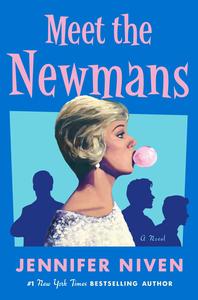
 Jennifer Niven (The Ice Master; When We Were Monsters) picks the pivotal year of 1964 as her setting for the charming, thought-provoking Meet the Newmans. The world is still reeling from the Kennedy assassination; many women who had been part of the workforce during World War II are questioning their place in society; and the Beatles have recently arrived in the U.S.
Jennifer Niven (The Ice Master; When We Were Monsters) picks the pivotal year of 1964 as her setting for the charming, thought-provoking Meet the Newmans. The world is still reeling from the Kennedy assassination; many women who had been part of the workforce during World War II are questioning their place in society; and the Beatles have recently arrived in the U.S.
Dinah Newman, 43, begins the story on March 20, 1964: "the night the world as she knew it ended." Her husband, Del--writer, director, and star of television's Meet the Newmans--has been in a car accident. Del and Dinah Newman are "America's favorite married couple," but no one knows they sleep in separate beds (even though they were the first to share one onscreen). Their sons, Guy, 22, and Shep, nearly 18, have grown up on the show. Guy longs to direct, and Shep, who launched a lucrative singing career, feels like he's owned not only by CBS Studios but also by CBS Records. When Del winds up in a coma, the Newmans know the show must go on even as they keep his condition a secret from the network. Just two episodes remain in the season, their sponsors have backed out, and the final episode's script has yet to be written. Plus, their 12-year contract may not be renewed.
Dinah taps journalist Juliet Dunne, who came to interview Dinah for the Los Angeles Times, to be her co-writer on the season finale. Juliet, age 26, is a daring choice, considering she made clear to Dinah just how "out of touch" she believes the series is, even leaving Dinah a copy of The Feminine Mystique. This fascinating relationship becomes the constellation around which the novel orbits, with wonderful moments from both Dinah and Juliet as they each discover what the other has to offer.
Meanwhile, Shep and Guy feel that their televised lives have sucked the vitality out of their lives offscreen. Shep acts out by sleeping his way across Los Angeles; Guy lives a closeted life with "best friend"--and movie star in his own right--Kelly Faber. And Dinah finds a mysterious deed to a house and their finances in peril: Did Del have a secret life? Everything blows up just days before the final episode, in a wonderfully farcical denouement.
Niven humorously and perceptively exploits the juxtaposition of a TV family who have lost the distinction between their on-air personas and their real lives. Niven wisely does not go for the quick fix or the sitcom ending. She instead leaves readers with a realistic picture of a loving family reconstituting itself as growing individuals after a tectonic shift. --Jennifer M. Brown
Shelf Talker: Jennifer Niven's moving exploration of a 1960s television family demonstrates how families can drift apart, and how they can reunite by celebrating each other as individuals.

